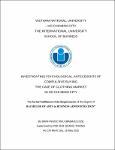| dc.description.abstract | This study investigates the psychological antecedents of compulsive buying in clothing.
Relying on the theories and previous researches, a model of three factors is proposed with
Compulsive Buying is the dependent variable while Neuroticism, Fashion Interest and
Money Attitude are the independent variables.
Neuroticism and Fashion Interest are hypothesized to have positive relations with
Compulsive Buying. Money Attitude has three dimensions which are Power-Prestige,
Retention Time and Quality. While Power-Prestige and Quality are proposed to have
positive relationship with Compulsive Buying, Retention Time is postulated to have the
negative relationship with the dependent variable.
A survey was conducted with a convenience sample size of 368 respondents from different
occupations. A majority of them are students from various colleges and universities in Ho
Chi Minh City.
Structural Equation Modeling were utilized to test the hypotheses. The research findings
indicate that Neuroticism, Fashion Interest as well as Power-Prestige of the Money Attitude
construct have positive relationships with Compulsive Buying. The negative relationship
between Retention Time and Compulsive Buying is also supported. However, there is no
evidence for a positive relationship between Quality and Compulsive Buying was rejected.
The theoretical contribution of this research is to successfully construct a new research
model that integrate three separate concepts in consumer psychology: Neuroticism,
Fashion Interest and Money Attitude in an attempt to explain consumers’ antecedents to
Compulsive Buying. This is also the first study to investigate the issue of compulsive
buying with Vietnamese sampling context. Thus, it has enriched the body of literature and
empirical studies in the topic. For managerial contribution, it showed that individuals who
are neurotic, interested in fashion and use money as the means to impress others and gain
recognition will have higher tendencies for compulsive buying. In contrast, individuals
who tend to save money for the future and engage in financial planning are less likely to
buy compulsively. These information are not only helpful for marketers who are interested
in encouraging compulsive buying behaviors of customers but also for policy makers,9
psychological consultants, psychological doctors... who are concerned about helping
people control their compulsive buying for a better and balanced life. | en_US |


